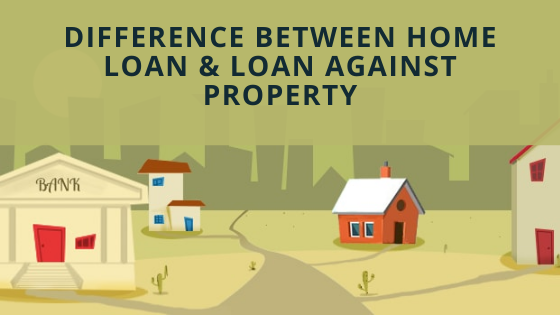Difference Between Home Loan And Loan Against Property

We received a call today. It was a loan inquiry. The enquirer wanted to know on the loan he can get on his property, his eligibility, time process, fees and importantly the rate of interest, in precise. Our executive before explaining re-confirmed “Is it loan against property that you want to know?” The enquirer exclaimed yes. The executive explained to him in detail about the product and assured him of our best services. “Ok. Will let you know in 2-3 days”, said the enquirer and the call ends. Later on 3rd day our executive follow-ups with the client, to learn that he has already made his choice to approach Bank A and have already submitted the documents for loan processing. On confirming the enquirer said that he found the rates were too high for him to apply with us. On the contrary, the executive explained, “Sir, rather the rates that we are providing is the lowest for mortgage loan”.
“Mortgage Loan!! No No. I am looking for home loan”, says the enquirer and disconnects the call. The executive gets no time to explain the confusion and the conversation ends there forever. This made one thing clear for the executive, that he learned to reconfirm with every enquirer, “Is it loan against property i.e. mortgage loan or home loan that you are looking for”.
Off the late, it is observed that many often use, home loans and loans against property as interchangeably. But in actually both are not the same, though in both we get the loan on the property. They are rather two different kinds of loans, even though both being secured loans. On the other hand loan against property and mortgage being the same can be used interchangeably.
Difference between Home Loan & Loan Against Property
| Sr. No. | Home Loan | Loan Against Property | |
| 1 | Meaning | Taken to purchase a new house either in resale or from builder – ready to move or under construction. | Taken against the already owned property. |
| It can be taken on the under-construction property. | Under-construction property cannot be mortgaged. | ||
| Available only on residential property. | Both residential and commercial property can be mortgaged. | ||
| 2 | End-use | Purely to purchase a residential property. | Purchasing a residential property + other personal reason such as business expansion, children marriage, child education, medical emergencies & treatments, etc |
| Funds are released to the builder in case of a builder transaction or to the seller of the property in case of a resale transaction. | Funds are credited in loan borrower’s account. | ||
| 3 | LTV (Loan To Value) i.e. Property Funding | Up-to 90% on the property’s market value. | Up-to 60 – 65% of the property’s market value. |
| 4 | Loan Tenure | Available up-to 30 years. | Maximum of 15 years. |
| 5 | Rate Of Interest | 1-2% lower than mortgage loan. | 1-2% higher than home loan. |
| 6 |
Processing
Fees | Ranges between 0.25% -1% on the loan amount. | Ranges between 0.40% – 1% on the loan amount. |
| 7 | Tax Exemptions | Exemption under section 80C for principal and section 24(b) for interest paid. | No exemptions for principal paid. Applicable only on interest paid: a) End-use for business purpose- interest can be claimed as business expenses under section 37 (1). b) End-use for purchasing house or home renovation or repairs interest can be claimed under section 24(b). c) End-use for personal reasons, education, marriage, etc – no interest exemption. Note: Need to maintain appropriate documents to justify the loan end-use, in order to claim the interest exemption. |
Regarding any kind of loan, Click here for Free Quotes
